SWEDISH
SOUTH ASIAN STUDIES NETWORK
Newsletter 84:
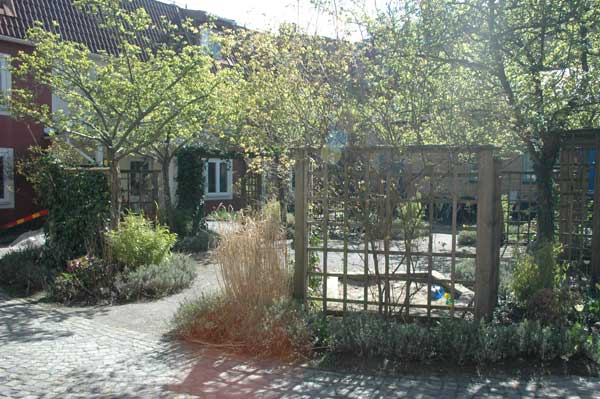 25 April 2008
25 April 2008
| Educational News |
| Politics and Business |
| South Asia related Culture |
| New and updated information |
• Dr. Sidsel Hansson substitutes as SASNET Director
SASNET's director, Anna Lindberg, is currently on sick leave. She will be back in office by September 1, 2008 at the latest. During Anna’s absence, Dr. Sidsel Hansson will substitute as director of SASNET on a 50% basis. She is also affiliated as a researcher to the Centre for East and South-East Asian Studies (ACE), Lund University.
• SASNET visit to Göteborg University and Chalmers
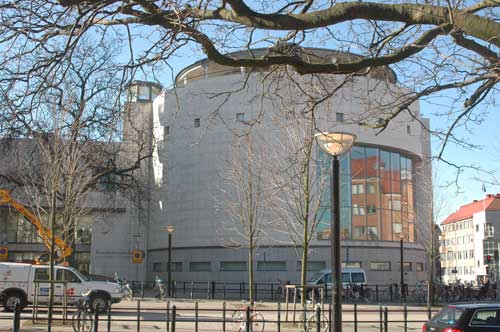 On Friday 18 April 2008, Lars Eklund and Sidsel Hansson from SASNET visited Göteborg University and Chalmers University of Technology. In the morning they participated in a seminar titled ”Indien – ett framtidsland?” (India – land of the future?), organised by the Board of Regional Research in West Sweden (Reväst), at the Dept. of Human and Economic Geography, School of Business, Economics
and Law (photo) at Göteborg University. In the afternoon, an informal meeting with researchers interested in South Asia related projects on technology was organised at Chalmers University of Technology for Lars and Sidsel. The meeting was convened by Dr. Catharina Hiort at Chalmers Biocenter, that co-ordinates bioengineering activities at Chalmers with an aim to strengthen research related to biology, biotechnology, and medicine. Full information about the SASNET visit to Göteborg.
On Friday 18 April 2008, Lars Eklund and Sidsel Hansson from SASNET visited Göteborg University and Chalmers University of Technology. In the morning they participated in a seminar titled ”Indien – ett framtidsland?” (India – land of the future?), organised by the Board of Regional Research in West Sweden (Reväst), at the Dept. of Human and Economic Geography, School of Business, Economics
and Law (photo) at Göteborg University. In the afternoon, an informal meeting with researchers interested in South Asia related projects on technology was organised at Chalmers University of Technology for Lars and Sidsel. The meeting was convened by Dr. Catharina Hiort at Chalmers Biocenter, that co-ordinates bioengineering activities at Chalmers with an aim to strengthen research related to biology, biotechnology, and medicine. Full information about the SASNET visit to Göteborg.
• SASNET Work Report 2007 now published
All Administrative reports regarding SASNET’s
work and activities from the first planning process
in 1999 till today are available at SASNET’s web site, see
more. The
latest report to be added is the Administrative report no. 8,
for the period 1 January – 31
december 2007. Go for the Work Report.
• Time to apply for SASNET grants
 Applications are now invited for the 2008 round of SASNET grants. Closing date for applications is
15 June 2008. There are three kinds of grants offered by SASNET:
Applications are now invited for the 2008 round of SASNET grants. Closing date for applications is
15 June 2008. There are three kinds of grants offered by SASNET:
– 1. Networking grants for planning new research and/or
education programmes or projects in collaboration between Swedish and South Asian partners;
– 2. Guest lecture programme grants (for inviting a guest lecturer
from South Asia to visit Swedish
universities), and
– 3. Grants for organising South Asia related interdisciplinary research
workshops either in Sweden or in South Asia.
Please note that the main applicant must always be
a researcher or teacher based at a Swedish university. All previously distributed SASNET grants are presented on our web page (go for the complete list).
Decisions will be taken in late August 2008. More information.
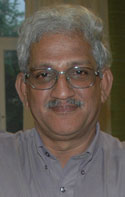 • SASNET seminar with Venkatesh B. Athreya
• SASNET seminar with Venkatesh B. Athreya
Professor Venkatesh B. Athreya, Economics Department at Bharathidasan University, Tiruchirapalli, India, holds a SASNET lecture at Lund University, on Monday 12 May 2008, 19.00–21.00. The lecture, jointly organised by SASNET and the Association of Foreign Affairs at Lund University (UPF), is titled ”Wealth and Poverty in
Rapidly Globalising India”. Among Prof. Athreya’s most well-known publications are ”Literacy and Empowerment” (with Sheela Rani Chunk, Sage Publications, 1996) and ”Barriers Broken” (with G. Djurfeldt and S. Lindberg, Sage Publications, 1990). Currently he is co-operating with the sociologists Göran Djurfeldt and Staffan Lindberg at Lund University in a restudy of 300 agricultural households in Tiruchirapalli District, Tamil Nadu, people who were originally interviewed in 1979/80. Venue: Athen, AF-Borgen, Sandgatan 2, Lund. More information (as a pdf-file)
• Successful business seminar held in Lund
On Thursday 10 April 2008, 12.00–17.00, SASNET and SIBC (Sweden-India Business Council) organised a business seminar in Lund in collaboration with the Ideon Science Park. The seminar was titled ”Operating in India” (Verksam i Indien), and included presentations focusing on challenges that Swedish companies face when they establish businesses in India. SASNET’s former Director, Prof. Staffan Lindberg, was the moderator, and deputy Director Lars Eklund made an introduction to the seminar (See the full programme). The issue of Corporate Social
Responsibility (CSR) was a key concept, and representatives of IKEA, Indiska magasinet, Lufthansa, and the Swedish Export Council discussed their experiences of CSR. Read a report from the business seminar.
• More information about SASNET and its
activities
See SASNET’s page, http://www.sasnet.lu.se/sasnet.html
• Still long way to go to reach the MDGs, according to World Bank-IMF report
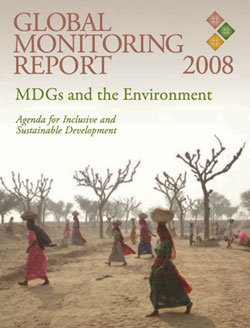 On April 8, the Global Monitoring Report 2008 was published. This new World Bank-IMF report entitled ”MDG:s and the Environment – Agenda for Inclusive and Sustainable Development” warns that most countries will fall short on the Millennium Development Goals (MDGs), a set of eight globally agreed development goals with a due date of 2015. Though much of the world is set to cut extreme poverty in half by then, prospects are gravest for the goals of reducing child and maternal mortality. Serious shortfalls also likely in primary school completion, nutrition, and sanitation goals.
The report also stresses the link between environment and development and calls for urgent action on climate change. To build on hard-won gains, developing countries need support to address the links between growth, development and environmental sustainability.
The 2008 Global Monitoring Report was authored by a team led by Zia Qureshi, Sr Adviser with the World Bank's Development Economics Vice Presidency, under the guidance of the Acting Chief Economist, Alan Gelb.
Regarding South Asia, the report says the region is on the path toward sustainable economic growth, with net adjusted saving on the rise, and a positive savings rate. The region is likely to halve by 2015 the number of people without access to safe drinking water, but will not achieve the same target for improved basic sanitation. More information.
On April 8, the Global Monitoring Report 2008 was published. This new World Bank-IMF report entitled ”MDG:s and the Environment – Agenda for Inclusive and Sustainable Development” warns that most countries will fall short on the Millennium Development Goals (MDGs), a set of eight globally agreed development goals with a due date of 2015. Though much of the world is set to cut extreme poverty in half by then, prospects are gravest for the goals of reducing child and maternal mortality. Serious shortfalls also likely in primary school completion, nutrition, and sanitation goals.
The report also stresses the link between environment and development and calls for urgent action on climate change. To build on hard-won gains, developing countries need support to address the links between growth, development and environmental sustainability.
The 2008 Global Monitoring Report was authored by a team led by Zia Qureshi, Sr Adviser with the World Bank's Development Economics Vice Presidency, under the guidance of the Acting Chief Economist, Alan Gelb.
Regarding South Asia, the report says the region is on the path toward sustainable economic growth, with net adjusted saving on the rise, and a positive savings rate. The region is likely to halve by 2015 the number of people without access to safe drinking water, but will not achieve the same target for improved basic sanitation. More information.
• Official KIRT–Pakistan program launched at Karolinska Institutet
 Karolinska Institutet Research and Training Committee (KIRT) launched a new phase in the collaborative KIRT–Pakistan program, with a function at KI on Thursday 17 April 2008. The collaboration between Karolinska Institutet (KI) and Aga Khan University (AKU) in Karachi will now be further strengthened. New aspects are put forward that include a decision that KI should only support Pakistan’s own PhD programme, and that a research committee will do the selection for candidates locally after an application procedure. From this year, Aga Khan University will also contribute to the collaboration program with a substantial amount of money to cover their own applications. AKU’s international expansion with own universities in Tazjikistan, Afghanistan and East Africa (with a main university in Arusha, Tanzania) will also be considered to be of special interest to KI since it increases possibilities for more collaborative projects. More information about KI’s long-standing collaboration with AKU.
During the official launch of the KIRT–Pakistan program, several presentations were given about the projects involved. Prof. Bo Lindblad presented past, present and future KI collaboration projects with Pakistan, and also informed about objectives and priority areas set up for the new KIRT–Pakistan program. More information (as a pdf-file).
Karolinska Institutet Research and Training Committee (KIRT) launched a new phase in the collaborative KIRT–Pakistan program, with a function at KI on Thursday 17 April 2008. The collaboration between Karolinska Institutet (KI) and Aga Khan University (AKU) in Karachi will now be further strengthened. New aspects are put forward that include a decision that KI should only support Pakistan’s own PhD programme, and that a research committee will do the selection for candidates locally after an application procedure. From this year, Aga Khan University will also contribute to the collaboration program with a substantial amount of money to cover their own applications. AKU’s international expansion with own universities in Tazjikistan, Afghanistan and East Africa (with a main university in Arusha, Tanzania) will also be considered to be of special interest to KI since it increases possibilities for more collaborative projects. More information about KI’s long-standing collaboration with AKU.
During the official launch of the KIRT–Pakistan program, several presentations were given about the projects involved. Prof. Bo Lindblad presented past, present and future KI collaboration projects with Pakistan, and also informed about objectives and priority areas set up for the new KIRT–Pakistan program. More information (as a pdf-file).
• Doctoral dissertation about educational opportunities in Sri Lanka
Jonas
Lindberg from the Dept. of Human and Economic Geography, School of Business, Economics
and Law at Göteborg University, defended his doctoral dissertation project titled ”Education for all in times of global transformations: Aspirations and opportunities of poor families in marginal areas of Sri Lanka” on Friday 9 December 2005. The empirical focus of
the study is on poor families in marginal parts of Hambantota District, in southern Sri Lanka.
A conclusion is that there is an ongoing process of stratification of
educational opportunities in the country. Faculty opponent was Prof. Holger Daun, Institute of International Education (IIE), Stockholm University. More information.
• Doctoral dissertation about support to Indian family planning programme in the 1970s
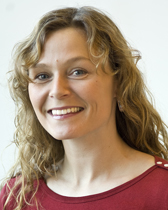 In 2006, Dr. Sunniva Engh defended her doctoral dissertation on Swedish and Norwegian population aid to India during the period 1965–95, at the Wellcome Unit for the
History of Medicine in Oxford, UK. The thesis, titled 'Population Control in the 20th Century: Scandinavian Aid to the Indian Family Planning Programme', examined why Sweden and Norway,
with their small domestic populations and low birth
rates, took a great interest in the population growth of
the developing countries. It is a comparative
analysis of Swedish and Norwegian interest in and
assistance for family planning in India, ensuring
a strengthening of the population control facilities,
predominantly sterilisation facilities, at more than
1500 hospitals. After the Indian Emergency of 1975–77,
the donors made dramatically different decisions regarding
their support: Sweden ended cooperation in 1980 as a
result of pressure from public opinion, while Norwegian
transfers increased sharply, and cooperation lasted until
1995.
In 2006, Dr. Sunniva Engh defended her doctoral dissertation on Swedish and Norwegian population aid to India during the period 1965–95, at the Wellcome Unit for the
History of Medicine in Oxford, UK. The thesis, titled 'Population Control in the 20th Century: Scandinavian Aid to the Indian Family Planning Programme', examined why Sweden and Norway,
with their small domestic populations and low birth
rates, took a great interest in the population growth of
the developing countries. It is a comparative
analysis of Swedish and Norwegian interest in and
assistance for family planning in India, ensuring
a strengthening of the population control facilities,
predominantly sterilisation facilities, at more than
1500 hospitals. After the Indian Emergency of 1975–77,
the donors made dramatically different decisions regarding
their support: Sweden ended cooperation in 1980 as a
result of pressure from public opinion, while Norwegian
transfers increased sharply, and cooperation lasted until
1995.
Dr. Engh is now working as a post doctoral fellow at the Forum for Contemporary History (FCH) in Oslo, a research group based at at the Department of Archaeology, Conservation and History, University of Oslo. She is engaged in a research project on the Norwegian tradition of peace, but recently a great deal of attention has been paid by Norwegian media to her previous research on population aid to India. On 7 March 2008, the University of Oslo magazine Apollon published an extensive article titled ”Brutal massesterilisering av indere” in its 1/2008 issue. Read the article in Apollon Magazine (in Norwegian only).
• Doctoral dissertation about South Asian peace and security
Rodrigo Tavares, Division of Peace and Development Research (PADRIGU),
School
of Global Studies, Göteborg University, defended his doctoral dissertation titled ”Understanding Regional Peace and Security: A Framework for Analysis” on 15 December 2006. The thesis has an emphasis on South Asia and Europe. Faculty opponent was Elzbieta Stadtmuller from the Institute of International Studies, University of Wroclaw, Poland. More information about the thesis.
• Doctoral dissertation about breeding of red junglefowls in India
Jennie Håkansson from the Dept. of Physics, Chemistry and Biology, Linköping University, defended her doctoral dissertation on ”Behavioural aspects of conservation breeding: Red junglefowl (Gallus gallus) as a case study” on Friday 23 November 2007. The thesis deals with endangered species of animals that currently are involved in conservation breeding programs worldwide. Conservation breeding deals with propagation of captive populations, often with the ultimate aim of releasing animals into the wild. However, an alarmingly high proportion of reintroductions have not been successful in establishing viable populations, possibly due to behavioural problems caused by genetic adaptation to captivity. During the project, behavioural studies have been carried out in zoos in Sweden, Denmark and India as well as in the field in the Himalayas of Northern India, where red junglefowls live wild in the jungle. More information with a link to the full-text thesis.
• Doctoral dissertation about shrimp monoculture in Sri Lanka
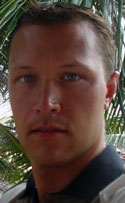 Daniel Alcala Bergquist, Dept. of Social and Economic Geography, Uppsala University, defended his doctoral dissertation titled ”Colonized Coasts.
Aquaculture and Energy flows in the World System:
Cases from Sri Lanka and the Philippines” on Friday 15 February 2008. The study reveals that semi-intensive shrimp monoculture in Sri Lanka generates few benefits for poor local people, and depends much on external inputs such as fry, feed and fuels, which implies negative environmental effects at local as well as global levels. Extensive polyculture in the Philippines involves more local people, and implies lower dependence on external inputs. Still, since benefits accrue mostly to elites, and mangroves are negatively affected, neither case is viable for sustainable poverty alleviation. The work has been carried out in collaboration between the department and the Cemus Research Forum (Cefo) at Uppsala University. Faculty opponent was Prof. Örjan Sjöberg, Dept. of Economics, Stockholm University. More information with a link to the full-text thesis.
Daniel Alcala Bergquist, Dept. of Social and Economic Geography, Uppsala University, defended his doctoral dissertation titled ”Colonized Coasts.
Aquaculture and Energy flows in the World System:
Cases from Sri Lanka and the Philippines” on Friday 15 February 2008. The study reveals that semi-intensive shrimp monoculture in Sri Lanka generates few benefits for poor local people, and depends much on external inputs such as fry, feed and fuels, which implies negative environmental effects at local as well as global levels. Extensive polyculture in the Philippines involves more local people, and implies lower dependence on external inputs. Still, since benefits accrue mostly to elites, and mangroves are negatively affected, neither case is viable for sustainable poverty alleviation. The work has been carried out in collaboration between the department and the Cemus Research Forum (Cefo) at Uppsala University. Faculty opponent was Prof. Örjan Sjöberg, Dept. of Economics, Stockholm University. More information with a link to the full-text thesis.
• Doctoral dissertation about impact of WTO’s TRIPs agreement in India
Rasmus Wendt, Graduate School of International Development Studies, Roskilde University (RUC), Denmark, defended his doctoral dissertation titled ”TRIPs in India – An analysis of the
impact of global governance on political processes in India and the wider
institutional settings for the pharmaceutical industry” on Friday 28 March 2008. His point of departure has been how WTO’s TRIPs agreement has impacted upon access to medicine, which was the core-issue during the South Africa court case on the medicine act in 2001. The assessment committee members were Laurids Lauridsen, RUC, Jørgen Dige Pedersen, University of Aarhus, and Prof. Wolfgang Hein, GIGA German Institute of Global and Area Studies.
• Doctoral dissertation about corruption in Bangladesh
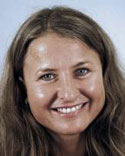 Tone K. Sissener from the Institute for Social Anthropology, University of Bergen, defended her doctoral dissertation titled ”A State of Corruption? An Anthropology of the South Asian State” on Friday 25 April 2008, 10.15. First opponent is Dr. Anne Waldrop, University of Oslo. The thesis deals with bureaucratic corruption in Bangladesh, with particular focus on the education sector. Ms. Sissener has two years of fieldwork experience from Bangladesh, and has also carried out consultancy projects and election observation in the country. Venue: Auditorium, Ulrike Pihls Hus, Professor Keysersgate 1, Bergen, Norway. More information.
Tone K. Sissener from the Institute for Social Anthropology, University of Bergen, defended her doctoral dissertation titled ”A State of Corruption? An Anthropology of the South Asian State” on Friday 25 April 2008, 10.15. First opponent is Dr. Anne Waldrop, University of Oslo. The thesis deals with bureaucratic corruption in Bangladesh, with particular focus on the education sector. Ms. Sissener has two years of fieldwork experience from Bangladesh, and has also carried out consultancy projects and election observation in the country. Venue: Auditorium, Ulrike Pihls Hus, Professor Keysersgate 1, Bergen, Norway. More information.
• Doctoral dissertation about Palula language in Hindu Kush
Henrik Liljegren, Dept. of Linguistics, Stockholm University, will defend his doctoral dissertation titled ”Towards a grammatical description of Palula, an Indo-Aryan
language of the Hindu Kush” on Monday 2 June 2008, 10.00. The dissertation is intended to provide a grammatical description of the Indo-
Aryan language Palula, spoken by approximately 10,000 people in Chitral
District in Pakistan’s North-West Frontier Province. No study with the scope
and detail of the current work has been presented in the past for this little-known language, and it is one of only a few in-depth studies available for
languages in the immediate surrounding of the Hindu Kush region. Venue: Hörsal 8, Hus D, Södra huset, Universitetsvägen 10 (Frescati), Stockholm.
• KTH colloquium on Groundwater for Sustainable Development
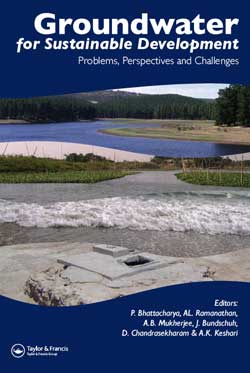 A colloquium on Groundwater for Sustainable Development
was held at the Royal Institute of Technology (KTH) in Stockholm on Friday 18 April 2008. The colloquium coincided with the launch of a new book by the International Groundwater Arsenic Research Group (GARG) at the Dept. of Land and Water Resources Engineering, KTH; and the International Society of Groundwater for Sustainable Development (ISGSD). It is titled “Groundwater for Sustainable Development: Problems, Perspectives and Challenges”, and has been dedicated to Prof. Emeritus Gunnar Jacks.
The volume is based on papers presented at an International conference held in New Delhi in February 2006, and it has been edited by Dr. Prosun Bhattacharya and his colleagues from several countries.
A colloquium on Groundwater for Sustainable Development
was held at the Royal Institute of Technology (KTH) in Stockholm on Friday 18 April 2008. The colloquium coincided with the launch of a new book by the International Groundwater Arsenic Research Group (GARG) at the Dept. of Land and Water Resources Engineering, KTH; and the International Society of Groundwater for Sustainable Development (ISGSD). It is titled “Groundwater for Sustainable Development: Problems, Perspectives and Challenges”, and has been dedicated to Prof. Emeritus Gunnar Jacks.
The volume is based on papers presented at an International conference held in New Delhi in February 2006, and it has been edited by Dr. Prosun Bhattacharya and his colleagues from several countries.
During the colloquium, Prof. Jacks talked about ”Visions on Sustainable Development of Groundwater Resources in Developing Countries”; Prof. Ramon Wyss (Advisor to the KTH President) talked about ”Current initiatives on Indo-Swedish collaborations – the INSTEC Platform”; Prof. Bjorn Hårsman (Dean, School of Architecture and Built Environment, KTH), talked about
”Groundwater Resources in Built Environment and Sustainability”; and Prof. Hans Lundberg (IVL) talked about ”Sustainable Urban Development in Developing Countries”. More information about the book launch and the colloquium.
• UNEP Year Book 2008 highlights changes in the global environment
The United Nations Environment Programme (UNEP) Year Book 2008 is the fifth annual report on the changing environment produced by Nairobi based UNEP in collaboration with many world environmental experts. The UNEP Year Book 2008, published on 12 March, highlights the increasing complexity and interconnections of climate change, ecosystem integrity, human well-being, and economic development. It examines the emergence and influence of economic mechanisms and market driven approaches for addressing environmental degradation. It describes recent research findings and policy decisions that affect our awareness of and response to changes in our global environment. In three sections, the UNEP Year Book 2008 focuses on recent environmental events, developments, and scientific findings: A Global Overview, A Feature Focus, and an Emerging Challenge section. More information on UNEP Year Book 2008.
• The Encyclopedia of Women & Islamic Cultures (EWIC) now completed
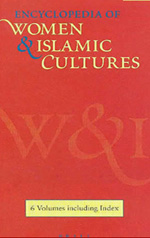 This multi-volume reference work, a unique collaboration of over 1000 scholars from around the world, crossing historical, geographical borders and disciplines, reflects the very latest research on gender studies and the Islamic world, including South Asia. It has been published during the period 2003–2007 in six volumes by Brill publishers in Leiden, the Netherlands, and with Dr. Suad Joseph from University of California, Davis, being the general editor. More information about EWIC.
This multi-volume reference work, a unique collaboration of over 1000 scholars from around the world, crossing historical, geographical borders and disciplines, reflects the very latest research on gender studies and the Islamic world, including South Asia. It has been published during the period 2003–2007 in six volumes by Brill publishers in Leiden, the Netherlands, and with Dr. Suad Joseph from University of California, Davis, being the general editor. More information about EWIC.
The EWIC project is also pleased to announce that the International Development Research Center (IDRC) in Canada awarded EWIC a grant in 2005 to update and expand its EWIC Scholars Database for on-line publication. The database, offered as a service to the international community of scholars and practitioners to facilitate information dissemination, networking, and knowledge building, is searchable by author, countries/regions, and topical areas of expertise. If your research and expertise is relevant to women and Islamic cultures and you are interested in being included in the EWIC Scholars Database, please fill out the contributor template, reachable from Dr. Suad Joseph's website, http://sjoseph.ucdavis.edu/ewic/.
• Kolkata research
training programme in social sciences
The Centre for Studies in Social Sciences, Calcutta, invites applications for its Research
Training Programme in History, Economics, Political Science, Geography, Sociology,
Social Anthropology, Development Studies and Cultural Studies. The programme which
will run from August 2008 to June 2009 is meant for research students in India and the
countries of the South in the early stages of their doctoral work. Applications are invited
from research students below the age of 30 years with a post-graduate degree in any
branch of humanities and the social sciences with at least 50% marks or B+ on an eight
point scale. Last date for receipt of applications from international participants is May 15, 2008, and for students from India May 30, 2008. More information.
• Stockholm seminar with Muhammad Yunus
A seminar with
Muhammad Yunus, the founder of Grameen Bank in Bangladesh, was held at Södra Teatern in Stockholm on Saturday 19 April 2008. Dr. Yunus, who jointly with Grameen Bank received the Nobel Peace Prize in 2006, held a lecture in connection to the launch of a Swedish translation of his recent book ”Creating a World Without Poverty: Social Business and the Future of Capitalism”. It was followed by a panel debate with invited guests, among them Mia Horn af Rantzien, acting Director-General for the Swedish International Development Cooperation Agency (Sida); Linus Bengtsson, social entrepreneur and PhD candidate at the Division of International health (IHCAR), Karolinska Institutet Medical University, Stockholm; and Bengt Westerberg, Chairman for the Swedish Red Cross and Vice President for the International Red Cross. More information.
• More information about South Asia related
research at Swedish and Nordic universities
See SASNET’s page, http://www.sasnet.lu.se/research.html
• Apply for Seventh South Asian Orientation Course in Human Rights and Peace Studies
 Applications are now invited for the Seventh South Asian Orientation Course in Human Rights and Peace Studies, that will be held during three months in the Summer 2008. Last date for receiving applications is 31 May 2008. The course will have a three months long distance learning beginning between 1 July 2008 and 30 September 2008; and, a two-week long Direct Orientation in November 2008 in Kathmandu, Nepal. The distance-learning will be conducted on the South Asia Forum for Human Rights’ (SAFHR) secure e-learning platform. Participants will also receive the course material on CDs. However, familiarity with e-learning skills and proficiency in the English language are essential. Between twenty to twenty-five participants, preferably between ages 25 and 45, will be selected on the basis of the nature and the quality of their involvement with the issues of human rights, peace, democracy and development in the region. A maximum of three participants from outside South Asia will be selected.
Applications are now invited for the Seventh South Asian Orientation Course in Human Rights and Peace Studies, that will be held during three months in the Summer 2008. Last date for receiving applications is 31 May 2008. The course will have a three months long distance learning beginning between 1 July 2008 and 30 September 2008; and, a two-week long Direct Orientation in November 2008 in Kathmandu, Nepal. The distance-learning will be conducted on the South Asia Forum for Human Rights’ (SAFHR) secure e-learning platform. Participants will also receive the course material on CDs. However, familiarity with e-learning skills and proficiency in the English language are essential. Between twenty to twenty-five participants, preferably between ages 25 and 45, will be selected on the basis of the nature and the quality of their involvement with the issues of human rights, peace, democracy and development in the region. A maximum of three participants from outside South Asia will be selected.
• World Bank calls for reevaluation of education policies in Pakistan
In a new report released on 17 April 2008, the World Bank calls for a reevaluation of education policies in the context of a dramatic increase in private schools for primary education in Pakistan. Between 2000 and 2005, the number of private schools increased from 32,000 to 47,000, and by the end of 2005, one-third of enrolled children at the primary level was studying in a private school. While overall enrollments increased by 10 percent between 2001 and 2005, the report says quality of education is lagging. Children in private schools score significantly higher than those in government schools, even when they are from the same village. In fact, it will take children in government schools 1.5 - 2.5 years of additional schooling to catch up to where private school children are in Class 3. Access the full World Bank report.
• More information about South Asia related
education at Swedish and Nordic universities
See SASNET’s page, http://www.sasnet.lu.se/education.html
• New Delhi conference on New Cultures of Intimacy and Togetherness in Asia
An International conference on ”New Cultures of Intimacy and Togetherness in Asia” will be held in New Delhi, India, 9–10 May
2008.
The conference seeks to bring together scholars working across areas such as sociology, gender studies, film/media studies, anthropology, popular culture, and urban studies in order to explore emerging cultures of intimacy and friendship in contemporary non-Western contexts. It is jointly organised by Brinda Bose from Nehru Memorial Museum and Library in New Delhi; and
Sanjay Srivastava from the Deakin University in Melbourne, Australia. More information.
• 22nd Pakistan workshop at Rook How
The 22nd Pakistan workshop will take place at Rook How in the Lake District, Cumbria, UK, 9–11 May 2008. The theme chosen for the 2008 Workshop is ”Spaces of Dialogue” and it is hoped that papers will deal with various forms of dialogue among Pakistanis, between Pakistanis and other groups, and dialogue about Pakistanis, both in the past and in the present, at home and abroad, and the global and local contexts in which these dialogues take place. This workshop was founded to bring together anthropologists and sociologists whose research involved Pakistan, Pakistani diaspora and South Asian Islam. It is however open also to researchers from other disciplines. The number of participants is however kept low (normally only 25 or less people) so an early registration is highly recommended. More information.
• Oslo conference on Bangladesh’s decisive moments

 The Norwegian Institute of International Affairs and the Royal Norwegian Ministry of Foreign Affairs, organises a half-day conference on ”Bangladesh’s decisive moments – and the Options facing Norway” on Tuesday 13 May 2008, 10.00–13.30.
Since January 2007, the caretaker government of Bangladesh has introduced wide-ranging economic and political reforms, focused on fighting corruption and on improving the financial system, and the government aims to hold new elections by the end of 2008.
The conference seeks to shed new light on the challenges and prospects facing Bangladesh – political, economic and environmental, and in the regional context, as well as on the relations between Norway and Bangladesh. The keynote speakers are Norwegian Minister of the Environment and International Development, Mr. Erik Solheim; and Mr. Farooq Sobhan, President of Bangladesh Enterprise Institute and former Ambassador and Foreign Secretary. Venue:
Ingeniørenes Hus, Kronprinsens gate 17, Oslo. More information.
The Norwegian Institute of International Affairs and the Royal Norwegian Ministry of Foreign Affairs, organises a half-day conference on ”Bangladesh’s decisive moments – and the Options facing Norway” on Tuesday 13 May 2008, 10.00–13.30.
Since January 2007, the caretaker government of Bangladesh has introduced wide-ranging economic and political reforms, focused on fighting corruption and on improving the financial system, and the government aims to hold new elections by the end of 2008.
The conference seeks to shed new light on the challenges and prospects facing Bangladesh – political, economic and environmental, and in the regional context, as well as on the relations between Norway and Bangladesh. The keynote speakers are Norwegian Minister of the Environment and International Development, Mr. Erik Solheim; and Mr. Farooq Sobhan, President of Bangladesh Enterprise Institute and former Ambassador and Foreign Secretary. Venue:
Ingeniørenes Hus, Kronprinsens gate 17, Oslo. More information.
• Copenhagen conference on Cities, Climate Change and Development
A conference on ”Cities, Climate Change and Development: Is Urban Change for Sustainability possible?” will be held in Copenhagen 14–15 May 2008. It is organised by the Association of Development Researchers in Denmark (FAU). The aim of the conference is to bring together Danish, Nordic and
International researchers from a variety of disciplinary backgrounds with development
practitioners (from donor agencies, consultancies and NGOs) and advanced students in
order to present and discuss important contemporary issues within Danish and
international development research and shed light on important processes of
development. The conference workshops include topics on ”Megacities; Climate change and sustainable development”, and ”Sustainable energy; Urban Ecosystems. Among the keynote speakers are found P.R. Shukla, Professor at the Indian Institute of Management (IIM)
Ahmedabad, India; and
Sameer Akbar, Environmental Specialist at the South Asia
Environment and Social Development Unit of the World Bank, New Delhi, India. Venue: Copenhagen Business School (CBS),
Dalgas Have 15,
2000 Frederiksberg (Copenhagen). More information.
• Edinburgh conference on Feminities and Masculinities in Indian Politics
![]() A conference on ”Feminities and Masculinities in Indian Politics” will be held in Edinburgh, Scotland, 15–16 May 2008. The conference, organised by the Centre for South Asian Studies at
University of Edinburgh, has an objective to generate nuanced understandings of the encounter between gender identities and political practices and discourses. Distinguished speakers include Prof. Paul Brass (Washington University), Prof. Wendy Singer (Kenyon College), Prof. Mrinalini Sinha (Penn State University), Prof. Patricia Jeffery (University of Edinburgh), and Prof. Tanika Sarkar (Jawaharlal Nehru University, Delhi). Besides the conference presentations, Prof. Tanika Sarkar will also hold a public lecture, the so-called Singhvi Public Lecture, on Thursday 15 May, 17.00. She will lecture about ”Designing Selves: Many Faces of Masculine and Feminine in
Colonial Times”. Full information about the conference.
A conference on ”Feminities and Masculinities in Indian Politics” will be held in Edinburgh, Scotland, 15–16 May 2008. The conference, organised by the Centre for South Asian Studies at
University of Edinburgh, has an objective to generate nuanced understandings of the encounter between gender identities and political practices and discourses. Distinguished speakers include Prof. Paul Brass (Washington University), Prof. Wendy Singer (Kenyon College), Prof. Mrinalini Sinha (Penn State University), Prof. Patricia Jeffery (University of Edinburgh), and Prof. Tanika Sarkar (Jawaharlal Nehru University, Delhi). Besides the conference presentations, Prof. Tanika Sarkar will also hold a public lecture, the so-called Singhvi Public Lecture, on Thursday 15 May, 17.00. She will lecture about ”Designing Selves: Many Faces of Masculine and Feminine in
Colonial Times”. Full information about the conference.
• Third
Annual Tamil Studies Conference in Toronto
The Third
Annual Tamil Studies Conference will be held at the University
of Toronto, 15–17 May 2008. The theme for the 2008 conference will
be "Being Human; Being Tamil: Personhood, Agency and Identity".
The plenary speakers are Prof.
Vidya Dehejia, Columbia University, New York, USA, and Prof.
David Shulman, Hebrew University, Jerusalem, Israel. The objective
of this conference, in response to questions posed by scholarly
critiques of universal conceptions of the human and unified notions
of identity, is to invite papers that investigate how “human” or "personhood" have
been imagined, conceptualized, practiced and performed throughout
history within the Tamil regions and traditions. More
information.
• Second International Sanskrit Computational Linguistics Symposium
in Providence
The Second International Sanskrit Computational Linguistics Symposium
and
Sanskrit Library Workshop will be held in Providence, Rhode Island, USA , 15–17 May 2008.
The International Digital Sanskrit Library Integration project (IDSLI) at Brown University will host the symposium/workshop to be held at Brown University in Providence. The Symposium follows upon the successful First International Sanskrit Computational Linguistics Symposium 29-31 October 2007 hosted by Gerard Huet at INRIA, Rocquencourt near Paris and the formation of the International Sanskrit Computational Linguistics Consortium.
• Örebro workshop on Gender, Sexuality, and Global Change
The Centre of Gender Excellence (GEXcel), Institute of Thematic Gender Studies, run jointly by Linköping University and Örebro University, invites to a workshop conference in Örebro 22–22 May 2008. The workshop deals with GEXcel's current Theme ”Gender, Sexuality, and Global Change”, and applications are especially welcome from junior and senior scholars whose research directly addresses one of the following three sub-themes: 1) Sexuality, Love and Social Theory; 2) Power and Politics: A Feminist View; and 3) Common and Conflicted: Rethinking Interest, Solidarity, and Action.” More information.
• 2nd Gujarat Studies Association Conference in Toronto
 The
Gujarat Studies Association will be holding its 2nd Biennial
Conference on 23-24 May 2008 at the University of Toronto, Canada.
The theme for the conference is "Identities:
Reflections on Global Gujarati Communities". It will
be organised in collaboration with the University of Toronto and
its New College, the Historical Studies Department at University
of Toronto Mississauga, the Centre for South Asian Studies, the
Religion in the Public Sphere Initiative and the Nirman Foundation.
Ali Asani, Kenya born Professor of the Practice of Indo-Muslim
Languages and Culture at Harvard University, USA, will be one of
the key speakers, along with Professor Radhika Desai from University
of Manitoba, Canada; and Professor Raymond B. Williams from Wabash College, Crawfordsville, Indiana, USA. More
information.
The
Gujarat Studies Association will be holding its 2nd Biennial
Conference on 23-24 May 2008 at the University of Toronto, Canada.
The theme for the conference is "Identities:
Reflections on Global Gujarati Communities". It will
be organised in collaboration with the University of Toronto and
its New College, the Historical Studies Department at University
of Toronto Mississauga, the Centre for South Asian Studies, the
Religion in the Public Sphere Initiative and the Nirman Foundation.
Ali Asani, Kenya born Professor of the Practice of Indo-Muslim
Languages and Culture at Harvard University, USA, will be one of
the key speakers, along with Professor Radhika Desai from University
of Manitoba, Canada; and Professor Raymond B. Williams from Wabash College, Crawfordsville, Indiana, USA. More
information.
• Uppsala conference on Swedish development research
![]() For the fourth time, Sida/SAREC – the unit for research cooperation within the the Swedish International Development Cooperation Agency Sida – will finance a conference on current Swedish development research, to be held in Uppsala 27–29 May 2008. Previously Sida has initiated three similar conferences, the first one in Göteborg in 2000, the second in Lund in 2003 (more information), and the third and most recent one, focusing on ”Structures of Vulnerability:
Mobilisation and Resistance”, was held in Stockholm in 2005 (more information). The 2008 conference is organised by the Centre for Sustainable Development in Uppsala, an inter-disciplinary centre for education and research on sustainable development, jointly run by Uppsala University and the Swedish University of Agricultural Sciences (SLU) in Uppsala.
The general theme for the conference will be “Meeting Global Challenges in Research Cooperation”. Researchers and development professionals are invited to gather and discuss key themes at the frontiers of research and global development issues. More specifically, the topics for discussion will be sustainable energy systems, maternal and child health, water and sanitation, soil degradation, sustainable agriculture, survival strategies of the poor, conflicts over natural resources, housing and infrastructure, human rights, democracy, global trade and climate change. Invited panels will also discuss research training strategies, future priorities in research questions and cooperation in research financing for global development.
All Sida/Sarec financed scientists and Sida staff have been invited to the Uppsala conference, as well as all others with an interest in the research areas presented. All accepted conference presentations and summaries of discussions will later be published in a book. Abstracts must be delivered before Tuesday 1 May 2008 (Note: extended deadline). Venue for the conference: Atrium Konferens, Dragarbrunnsgatan 46, Uppsala. More information.
For the fourth time, Sida/SAREC – the unit for research cooperation within the the Swedish International Development Cooperation Agency Sida – will finance a conference on current Swedish development research, to be held in Uppsala 27–29 May 2008. Previously Sida has initiated three similar conferences, the first one in Göteborg in 2000, the second in Lund in 2003 (more information), and the third and most recent one, focusing on ”Structures of Vulnerability:
Mobilisation and Resistance”, was held in Stockholm in 2005 (more information). The 2008 conference is organised by the Centre for Sustainable Development in Uppsala, an inter-disciplinary centre for education and research on sustainable development, jointly run by Uppsala University and the Swedish University of Agricultural Sciences (SLU) in Uppsala.
The general theme for the conference will be “Meeting Global Challenges in Research Cooperation”. Researchers and development professionals are invited to gather and discuss key themes at the frontiers of research and global development issues. More specifically, the topics for discussion will be sustainable energy systems, maternal and child health, water and sanitation, soil degradation, sustainable agriculture, survival strategies of the poor, conflicts over natural resources, housing and infrastructure, human rights, democracy, global trade and climate change. Invited panels will also discuss research training strategies, future priorities in research questions and cooperation in research financing for global development.
All Sida/Sarec financed scientists and Sida staff have been invited to the Uppsala conference, as well as all others with an interest in the research areas presented. All accepted conference presentations and summaries of discussions will later be published in a book. Abstracts must be delivered before Tuesday 1 May 2008 (Note: extended deadline). Venue for the conference: Atrium Konferens, Dragarbrunnsgatan 46, Uppsala. More information.
• Stockholm symposium on South Asian Languages in an Areal-Typological Perspective
A symposium on ”South Asian Languages in an Areal-Typological Perspective” will be held at Stockholm University on
Friday 30 May 2008, 10.00–16.00. It is organised by Henrik Liljegren, researcher at the Dept. of Linguistics, Stockholm University. Along with Naseem Haider from the Frontier
Language Institute in Peshawar, Pakistan, he will give a presentation on ”Some approaches to building lexical databases in
languages of the Hindu Kush”. Other participants at the symposium include Prof. Peter E. Hook from the University of Virginia, USA, who will talk about ”EAT-expressions in Hindi,
Marathi, and Kashmiri”; Dr. Joan Baart from the Summer Institute of Linguistics, who will talk about ”Stress and Tone in
North-West Indo-Aryan”; Dr. Ruth Schmidt, University of Oslo, who will talk about ”Cross-dialect variation in the
Shina vocabulary as an effect of language contact”; and Dr. Anju Saxena, Dept. of Linguistics, Uppsala University, who will talk about ”Linguistic and cultural (co)variation in Kinnauri – The case of Harijan boli and Kinnauri”. Venue:
Stockholm University, Room C307, House D, Southern House, Universitetsvägen 10 (Frescati). More information from Henrik Liljegren.
• Lund University Workshop on Sikhs in Europe
An Exploratory Workshop on ”The Sikhs in Europe.
History, Religion and Representation” will be held at Lund University, 13–14 June 2008. The conference is organised by the Division of Indic Religions at the Dept. of History and Anthropology
of Religion, Lund University, and funded by the Bank of Sweden Tercentenary Foundation, the Swedish Research
Council, the Swedish Council for Working Life and Social Research and the Wenner-Gren
Foundation. The invited speakers include
Prof. Shinder Thandi from Coventry University, UK, who will speak about ”Migration and History of the Sikhs in Europe”; and Prof. David Omissi, University of Hull, UK, who will speak about ”Indian Soldiers in Europe, 1914–1918”.
The entire workshop is public, and all are welcome. On the second day, discussions will also be held regarding possibilities for future European collaborative research projects on Sikhs in Europe. Students and researchers interested in this topic should register to the conference convenor, Dr. Kristina Myrvold, in beforehand. Venue: Room 118 at the Centre for Theology and Religious Studies, Allhelgona Kyrkogata 8, Lund. More information.
• Nottingham conference on Social Movements and/in the Postcolonial
A conference titled ”Social Movements and/in the Postcolonial: Dispossession, Development and Resistance in the Global South” will be held in Nottingham, UK, 23–25 June 2008. It is hosted by the Centre for the Study of Social and Global Justice (CSSGJ) at the School of Politics and International Relations, University of Nottingham. The conference will be structured around the following two streams of discussion: Struggles over dispossession in the global South and Social movements and the politics of development. More information.
• 5th Dalit Minority International Conference to be held in New York
The 5th Dalit Minority International Conference will be held in New York, USA, 4–6 July 2008. More than 2,000 delegates from India and other countries are expected to meet to discuss the challenges and opportunities being faced by minorities, Dalits and other backward classes in India. It will be organised by the American Federation of Muslims of Indian Origin (AFMI) on behalf of the Dalit & Minorities International Forum (D&MIF). The conference will be chaired by Indian Union Minister for Steel, Ram Vilas Paswan. The previous Dalit Minority International Conference was held in New Delhi in December 2006 (more information). Venue for the 2008 conference: Hotel Mariott, Long Island in Uniondale, New York. More information.
• Tamil Nadu conference on Indian psychiatry encountering medical anthropology
A conference entitled ”Ganesha and Murugan: Indian psychiatry encounters medical anthropology” will be held in Kovalam village, Tamil Nadu, India on 3–5 November 2008. The course, jointly organised by the
University College London’s (UCL) Centre for Behavioural and Social Sciences in Medicine ; and the Banyan Academy of Leadership in Mental Health (BALM). It is aimed at mental health professionals, medical anthropologists & other social scientists working or researching in mental health across cultures. Participants will gain a comprehensive understanding of the cultural validity of current theory and practice of mental health in South Asia, offer a critique of current mental health theory and practice, and conceptualise alternative frameworks for understanding mental health concerns in the region. An initial course, held in February 2008, entitled ‘Mental Health at the Margins’ was highly successful, leading to further funding and support from UCL for the second programme. It is anticipated that a joint UCL-BALM research centre will shortly be established to pursue mental health issues in the region. The conference is held in Kovalam village, located 35 km away from Chennai. More information.
• Other conferences connected to South Asian
studies arranged all over the World
See SASNET’s page, http://www.sasnet.lu.se/conferences.html#conf
Important lectures and seminars in Scandinavia
• CPAS lecture on the Dalai lama institution and its significance today
Dr. Urban Hammar from the Forum for South and Central Asian Studies (ForSCASS), Department of
Oriental Languages, Stockholm University, will lecture on ”Dalai Lama-institutionens historia och dess betydelse i dag” (the Dalai lama institution and its significance today) in Stockholm on Wednesday 7 May 2008, 15–17. It is one of the Wednesday lectures arranged by the Centre for Pacific Asian Studies, CPAS, at Stockholm University. Venue for the lecture: B-salen, Dept. for Oriental Languages, Kräftriket 4 (earlier Roslagsvägen 101), Stockholm.
• Nitya Rao lectures in Uppsala on the Politics of Land and Gender
Dr. Nitya Rao from the School of Development Studies, University of East Anglia, UK, presents a paper on ”The Politics of Land and Gender. Critical Issues and Debates” in Uppsala on Wednesday 7 May 2008, 10.15–12.00. In this seminar, Dr. Rao addresses the rationale for women‚s land rights in key policy arenas, both globally and locally. Furthermore, she explores the gaps and contradictions that are found in practice. The seminar arranged by the Swedish Development Network (Devnet), the Seminar for Development Studies at Uppsala University, and the Department of Urban and Rural Development, Swedish University of Agricultural Sciences (SLU). Dr. Maria Ågren, Department of History, Uppsala University, will be the discussant.
The seminar is open to all interested. No pre-registration is necessary. Venue: Room 2, Main University Hall (Universitetsbyggnaden), Övre Slottsgatan/S:t Olofsgatan, Uppsala. More information.
• Hema Goonatilake lectures in Lund on Buddhist Leadership in the Wake of Tsunami
![]() Dr. Hema Goonatilake from the Social Sciences of the Sri Lanka Association for the Advancement of Science holds a lecture on ”Compassion and Courage: Buddhist Leadership in the Wake of Tsunami” at Lund University on Thursday 8 May 2008, 09.00–10.15. The lecture is organised by the Centre for East and South-East Asian Studies (ACE) and is being part of its so-called Focus Asia lecture series focusing on ”Moral and Political Leadership in Asia”. Dr. Goonatilake has pioneered the campaign for the re-establishment of the Bhikkhuni order in Sri Lanka and she has also co-founded the Centre for Women’s Research in Sri Lanka. Other lectures during the Focus Asia lecture series (held during two days, 8–9 May) deal with religious and political leadership in other Asian countries such as Burma, Thailand, Japan, China, and Tibet. Venue: Knuten Hall, Lundia Hotel, Knut den Stores torg 2, Lund. The lectures are open to the general public and entry is free of charge. More information.
Dr. Hema Goonatilake from the Social Sciences of the Sri Lanka Association for the Advancement of Science holds a lecture on ”Compassion and Courage: Buddhist Leadership in the Wake of Tsunami” at Lund University on Thursday 8 May 2008, 09.00–10.15. The lecture is organised by the Centre for East and South-East Asian Studies (ACE) and is being part of its so-called Focus Asia lecture series focusing on ”Moral and Political Leadership in Asia”. Dr. Goonatilake has pioneered the campaign for the re-establishment of the Bhikkhuni order in Sri Lanka and she has also co-founded the Centre for Women’s Research in Sri Lanka. Other lectures during the Focus Asia lecture series (held during two days, 8–9 May) deal with religious and political leadership in other Asian countries such as Burma, Thailand, Japan, China, and Tibet. Venue: Knuten Hall, Lundia Hotel, Knut den Stores torg 2, Lund. The lectures are open to the general public and entry is free of charge. More information.
• Two lectures by William S. Sax in Oslo
William S. Sax, Professor of Anthropology at the South Asia Institute in Heidelberg, Germany, holds two lectures in Oslo on Thursday 8 May 2008. Prof. Sax has done extensive fieldwork in the Himalayas. His research interests concentrate on the royal gods of the Indian Himalayas, on hero traditions, exorcism and black magic, anthropological medicine and ritual healing, Indian theatre, and Dalits of North India.
14.15–16.00, he will lecture about ”Divine Kingship in North India”. This was a common feature of pre-colonial Hindu kingship, where kings were
said to be one-eighth divine. But a number of tiny Central Himalayan states between Nepal and
Kashmir developed forms of divine kingship that went much further than this, with human kings
ruling as representatives of lineage gods, etc. Venue: Seminar rom 9, Sophus Bugges hus, University of Oslo, Blindern. 18.15–20.00, he will lecture about ”Sorcery and Cursing in the Central Himalayas”.
Rituals of aggression such as cursing and sorcery are commonly practiced by the peasant inhabitants
of District Chamoli in the North Indian state of Uttarakhand. However, because such rituals are regarded as immoral, those who practice them typically re-define them as acts of defense rather than aggression. Venue: Seminar rom 2, Sophus Bugges hus, University of Oslo, Blindern. More information.
• Oslo lecture about Large Dams in Northeast India
Associate Professor Nani Gopal Mahanta, Dept. of Political Science at Gauhati University, India, lectures about ”Large Dams in Northeast India: People, Power and Policy” in Oslo on Wednesday 14 May 2008, 10.00–12.00. It is organised by Poverty and Development in the 21st Century (PAD) research programme at the Centre for Development and the Environment (SUM), University of Oslo. Dr Mahanta also coordinates a Peace and Conflict Studies programme at Gauahti University. His doctoral work was on 'State, Identity and Violence: The case of ULFA' and his research interests include issues of peace and conflict resolution, human security, politics of identity and South Asian politics. Venue: 4th floor seminar room, SUM, Sognsveien 68, Oslo. More information.
• Prof. Baladas Ghoshal holds CPAS lectures in Stockholm
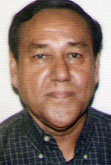 Prof. Baladas Ghoshal from the Academy of Third World Studies, Jamia Milia Islamia, New Delhi, India, holds two CPAS (Centre for Pacific Asian Studies) lectures at Stockholm University on Wednesday 14 May 2008. 11.00–12.30, he will talk about 'Changing Face of Islam in Southeast Asia and its Implications', where he desribes how for centuries, Islam in Southeast Asia was renowned for its adaptability to local practices and tolerance of other religions. Over the past three decades, however, fundamentalists have tried to homogenize Islam, introducing new tensions. 14.00–15.30, Prof. Ghoshal will talk about 'Rise of China and India and their implications', where he focuses on the fact that the rise of China and India has different meaning and manifestation. The rise of the former is an assertion of its self-conceived historical place and a challenge to the existing world order. In the case of the former, it is not so much of a rise but the reemergence of India wanting to play a role in global strategic and economic sphere. Prof. Ghoshal is a former Professor of Southeast Asia and South-West Pacific Studies and Chairman of the Centre for South and Southeast Asian Studies at Jawaharlal Nehru University in New Delhi. Venue for the lectures: B-salen, Dept. for Oriental Langiages, Kräftriket 4 (earlier Roslagsvägen 101), Stockholm.
Prof. Baladas Ghoshal from the Academy of Third World Studies, Jamia Milia Islamia, New Delhi, India, holds two CPAS (Centre for Pacific Asian Studies) lectures at Stockholm University on Wednesday 14 May 2008. 11.00–12.30, he will talk about 'Changing Face of Islam in Southeast Asia and its Implications', where he desribes how for centuries, Islam in Southeast Asia was renowned for its adaptability to local practices and tolerance of other religions. Over the past three decades, however, fundamentalists have tried to homogenize Islam, introducing new tensions. 14.00–15.30, Prof. Ghoshal will talk about 'Rise of China and India and their implications', where he focuses on the fact that the rise of China and India has different meaning and manifestation. The rise of the former is an assertion of its self-conceived historical place and a challenge to the existing world order. In the case of the former, it is not so much of a rise but the reemergence of India wanting to play a role in global strategic and economic sphere. Prof. Ghoshal is a former Professor of Southeast Asia and South-West Pacific Studies and Chairman of the Centre for South and Southeast Asian Studies at Jawaharlal Nehru University in New Delhi. Venue for the lectures: B-salen, Dept. for Oriental Langiages, Kräftriket 4 (earlier Roslagsvägen 101), Stockholm.
• Sida Development Area forum on Successful Strategies for Women's Health and Rights
 A Sida Development Area forum on ”Successful Strategies for Women's Health and Rights” will be held in Stockholm on Friday 16 May 2008, 09.00–14.00. Sida Development Area is an activity organised by the Swedish International Development Cooperation Agency, Sida, being a place for the development of new ideas and approaches to development cooperation. Key people to participate in creating better development cooperation are invited to thematic sessions.
The speakers invited give their views of the challenges, and everyone contributes to an exciting discussion, and bring home new ideas and contacts. The 16 May forum will focus on how successful strategies for women's health and rights can be developed? How can governments, agencies, organizations, researchers and companies contribute and cooperate more successfully? The invited speakers include Dr. Quazi Suraiya Sultana (photo to the right), Executive Director of the Reproductive Health Services Training and Education Program (RHSTEP) in Bangladesh; Renée Andersson, Director of Ethics and Environment at the Swedish fashion and decorating firm, Indiska; and Anders Nordström, Director-General and head of Sida. Until recently Mr. Nordström was the Assistant Director-General of the World Health Organisation (WHO). The number of seats are limited and personal invitations are therefore required. It is howeevr also possible to view the speeches and some of the discussions live on Internet on May 16. This material will also be available as ondemand version. More information.
A Sida Development Area forum on ”Successful Strategies for Women's Health and Rights” will be held in Stockholm on Friday 16 May 2008, 09.00–14.00. Sida Development Area is an activity organised by the Swedish International Development Cooperation Agency, Sida, being a place for the development of new ideas and approaches to development cooperation. Key people to participate in creating better development cooperation are invited to thematic sessions.
The speakers invited give their views of the challenges, and everyone contributes to an exciting discussion, and bring home new ideas and contacts. The 16 May forum will focus on how successful strategies for women's health and rights can be developed? How can governments, agencies, organizations, researchers and companies contribute and cooperate more successfully? The invited speakers include Dr. Quazi Suraiya Sultana (photo to the right), Executive Director of the Reproductive Health Services Training and Education Program (RHSTEP) in Bangladesh; Renée Andersson, Director of Ethics and Environment at the Swedish fashion and decorating firm, Indiska; and Anders Nordström, Director-General and head of Sida. Until recently Mr. Nordström was the Assistant Director-General of the World Health Organisation (WHO). The number of seats are limited and personal invitations are therefore required. It is howeevr also possible to view the speeches and some of the discussions live on Internet on May 16. This material will also be available as ondemand version. More information.
• Stockholm seminar on strategy for rural development in Afghanistan
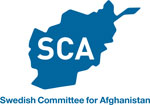 In connection with the yearly meeting of the Swedish Committee for Afghanistan (SCA), a seminar related to SCA’s newly adopted strategy for rural development will be held in Stockholm on Sunday 25 May 2008, 10.00–15.00. Invited speakers are Dr Nazir Qayoome, SCA Rural Development coordinator, Mrs Horia Mosadiq, SCA Human right and Gender Coordinator and Mr Andreas Stefanson, SCA Programme Director.
The Rural Development Programme (RDP) is a new initiative embarked upon by SCA in 2007, in conjunction with the finalisation of the Organisational Development process. The programme builds on a merger of SCA’s projects within Water and Sanitation (WatSan), the functions of SCA’s former Community Organisation Unit, and SCA’s facilitating role in the National Solidarity Programme. These now all fall within one programmatic framework for Rural Development, in which the long term goal is to contribute to poverty reduction by promoting sustainable community development. Venue: Alla kvinnors hus, Svartensgatan 3, Stockholm. More information about SCA’s rural development programme.
In connection with the yearly meeting of the Swedish Committee for Afghanistan (SCA), a seminar related to SCA’s newly adopted strategy for rural development will be held in Stockholm on Sunday 25 May 2008, 10.00–15.00. Invited speakers are Dr Nazir Qayoome, SCA Rural Development coordinator, Mrs Horia Mosadiq, SCA Human right and Gender Coordinator and Mr Andreas Stefanson, SCA Programme Director.
The Rural Development Programme (RDP) is a new initiative embarked upon by SCA in 2007, in conjunction with the finalisation of the Organisational Development process. The programme builds on a merger of SCA’s projects within Water and Sanitation (WatSan), the functions of SCA’s former Community Organisation Unit, and SCA’s facilitating role in the National Solidarity Programme. These now all fall within one programmatic framework for Rural Development, in which the long term goal is to contribute to poverty reduction by promoting sustainable community development. Venue: Alla kvinnors hus, Svartensgatan 3, Stockholm. More information about SCA’s rural development programme.
• Göteborg seminar with eminent international researchers on Sri Lanka
The School of Global Studies, Göteborg University, organises a seminar with two eminent international researchers on Sri Lanka, on Thursday 29 May 2008, 13.15–16.00. Professor Jonathan Goodhand (photo to the right) from the School of African and Asian Studies (SOAS), University of London, UK, and Professor Tudor Silva from Peradeniya University, Sri Lanka, will present results from their ongoing research projects. Prof. Goodhand will talk about ”The limits of liberal peacebuilding: international engagement in the Sri Lankan peace process”; and Prof. Silva will talk about ”Ethnicity, Development, Poverty, and Conflict in Sri Lanka”. Venue: School of Global Studies, room C 417, Konstepidemins väg, Göteborg.
Business and Politics
Globe Forum Conference in Stockholm, May 7–8, 2008
 Globe Forum is an annual international conference held in Stockholm for business leaders, entrepreneurs, academics, political leaders and state actors working in the most dynamic growing markets. This year's theme is: Business Innovation for Sustainable Growth. It takes place 7–8 May 2008, at China Theatre and Berns in Stockholm. The primary focus of the conference is to share views and information from the fastest growing markets: China, India, Central and Eastern Europe and the Gulf region, and inspire new business opportunities in the light of global environmental and social challenges. The conference addresses the technology and consumer perspectives and the broader energy areas, including energy availability and usage, transport and environmental issues.
Globe Forum is an annual international conference held in Stockholm for business leaders, entrepreneurs, academics, political leaders and state actors working in the most dynamic growing markets. This year's theme is: Business Innovation for Sustainable Growth. It takes place 7–8 May 2008, at China Theatre and Berns in Stockholm. The primary focus of the conference is to share views and information from the fastest growing markets: China, India, Central and Eastern Europe and the Gulf region, and inspire new business opportunities in the light of global environmental and social challenges. The conference addresses the technology and consumer perspectives and the broader energy areas, including energy availability and usage, transport and environmental issues.
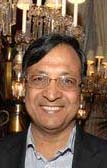 The
Swedish International Development Cooperation Agency (Sida) is one of Globe Forum's partners this year. Sida's new Director-General Anders Nordström will be one of the speakers and Deputy Director-General Mia Horn af Rantzien will take part in one of the workshops. Other invited speakers for the 2008 Globe Forum include Dipal Chandra Barua (photo to the right),
Deputy Managing Director for
Grameen Shakti (the
Nobel Prize Laureate microcredit institution); K.P. Nyati,
Principal Adviser, Confederation of Indian Industry (CII); and Prof. Hans Rosling, Division of International health (IHCAR), Karolinska Institutet Medical University, Stockholm. The Human Rights Lawyer Parul Sharma from South Asia Experts, and Bharti Patel from the
Society for Voluntary Action Revitalisation and Justice (SVARAJ) in Bangalore, also participate in a seminar on ”The rise of microfinance: How village women challenge Wall Street men” along with Mr. Barua. More information about Globe Forum 2008.
The
Swedish International Development Cooperation Agency (Sida) is one of Globe Forum's partners this year. Sida's new Director-General Anders Nordström will be one of the speakers and Deputy Director-General Mia Horn af Rantzien will take part in one of the workshops. Other invited speakers for the 2008 Globe Forum include Dipal Chandra Barua (photo to the right),
Deputy Managing Director for
Grameen Shakti (the
Nobel Prize Laureate microcredit institution); K.P. Nyati,
Principal Adviser, Confederation of Indian Industry (CII); and Prof. Hans Rosling, Division of International health (IHCAR), Karolinska Institutet Medical University, Stockholm. The Human Rights Lawyer Parul Sharma from South Asia Experts, and Bharti Patel from the
Society for Voluntary Action Revitalisation and Justice (SVARAJ) in Bangalore, also participate in a seminar on ”The rise of microfinance: How village women challenge Wall Street men” along with Mr. Barua. More information about Globe Forum 2008.
• Information about South Asia related business and politics in Sweden
See SASNET's page, http://www.sasnet.lu.se/polbuss.html
South Asia related culture in Scandinavia
• Third Annual Day celebration of Saraswathy Kalakendra Institution of Fine Arts
Saraswathy Kalakendra Institution of Fine Arts in Huddinge invites for its third Annual Day celebration on Saturday 26 April 2008, from 16.00. The Bharata Natyam dance school was started in 2004 by Usha Balasundaram, originally from Kerala and trained at the famous dance institution Kalakshetra College of Fine Arts in Chennai, India. During the annual day celebration, traditional folk dances of India and Bollywood dance will be performed. Deepa Gopalan Wadhwa, Ambassador of India to Sweden, will be the guest of honour at the Annual day celebration. Venue: ABF Auditorium, Kommunalvägen 26, Huddinge.
• Grand finale for Bollywood exhibition in Stockholm
 The exhibition "BOLLYWOOD
– Living gods of India" at the Museum of Far Eastern Antiquities (Östasiatiska
Museet) in Stockholm closes down on Sunday 27 April 2008. The exhibition takes
off in Indian films, and shows how contemporary India is connected
to its past through stories and myths about love, gods and heroes.
The gods belong to the everyday, but they are also worshiped in
great style at various festivities all year round. But India is
not only Hinduism. India is also the world’s third largest Muslim
country , and many Christians, Jains,
Buddhists and Zoroastrians live here too. In the exhibition, the
museum’s own collections of sculptures and paintings meet
newer, borrowed and purchased material, including popular prints, painted altar figures
made of straw and clay, picture scrolls from Midnapur, printed
and hand-painted Bollywood posters, contemporary photographs and
a great many Bollywood films. On Sunday 27 April 2008, 11–17, the exhibition gets a grand finale with an event called Bye Bye Bollywood. Maria Brevitz Bhardwaj (photo to the right) will perform with a Bollywood dance show along with her group Nritya Darpan. The Bollywood movie ”Dil jo bhi kahey”, partly recorded in Sweden, will be shown and introduced by the actor Christer Holmgren. There will also be a possibility to do block printing. Venue: Museum of
Far Eastern Antiquities, Skeppsholmen, Stockholm. See the full programme.
The exhibition "BOLLYWOOD
– Living gods of India" at the Museum of Far Eastern Antiquities (Östasiatiska
Museet) in Stockholm closes down on Sunday 27 April 2008. The exhibition takes
off in Indian films, and shows how contemporary India is connected
to its past through stories and myths about love, gods and heroes.
The gods belong to the everyday, but they are also worshiped in
great style at various festivities all year round. But India is
not only Hinduism. India is also the world’s third largest Muslim
country , and many Christians, Jains,
Buddhists and Zoroastrians live here too. In the exhibition, the
museum’s own collections of sculptures and paintings meet
newer, borrowed and purchased material, including popular prints, painted altar figures
made of straw and clay, picture scrolls from Midnapur, printed
and hand-painted Bollywood posters, contemporary photographs and
a great many Bollywood films. On Sunday 27 April 2008, 11–17, the exhibition gets a grand finale with an event called Bye Bye Bollywood. Maria Brevitz Bhardwaj (photo to the right) will perform with a Bollywood dance show along with her group Nritya Darpan. The Bollywood movie ”Dil jo bhi kahey”, partly recorded in Sweden, will be shown and introduced by the actor Christer Holmgren. There will also be a possibility to do block printing. Venue: Museum of
Far Eastern Antiquities, Skeppsholmen, Stockholm. See the full programme.
• More information about South Asia related culture
in Sweden and Scandinavia
See SASNET’s page, http://www.sasnet.lu.se/culture.html
New and updated items on SASNET web site
• Swedish departments where research on
South Asia is going on:
Constantly added to the list of research environments at Swedish
universities, presented by SASNET. The full list now includes 228 departments,
with detailed descriptions of the South Asia related research and education
taking place! Go to http://www.sasnet.lu.se/environment.html
• Useful travelling information
Look at http://www.sasnet.lu.se/travelling.html.
Updated travel advises from the The British Foreign & Commonwealth
Office about safety aspects on travelling to the countries of
South Asia.
Best regards,
Lars Eklund
SASNET/Swedish South Asian Studies Network
SASNET is a national network
for research, education, and information about South Asia, based at Lund
University. The aim is to encourage and promote an open and dynamic networking
process, in which Swedish researchers co-operate with researchers in South
Asia and globally.
The network is open to all sciences. Priority is given to co-operation
between disciplines and across faculties, as well as institutions in the
Nordic countries and in South Asia. The basic idea is that South Asian
studies will be most fruitfully pursued in co-operation between researchers,
working in different institutions with a solid base in their mother disciplines.
The network is financed by Sida (Swedish
International Development Cooperation Agency) and by Lund
University.
Postal address: SASNET – Swedish South Asian Studies Network,
Scheelevägen 15 D, SE-223 70 Lund, Sweden
Visiting address: Ideon Research Park, House Alpha 1 (first floor,
room no. 2040), in the premises of the Centre for East and South
East Asian Studies at Lund University (ACE).
Phone: + 46 46 222 73 40
Fax: + 46 46 222 30 41
E-mail: sasnet@sasnet.lu.se
Web site:
http://www.sasnet.lu.se
SASNET - Swedish South Asian Studies Network/Lund
University
Address: Scheelevägen 15 D, SE-223 70 Lund, Sweden
Phone: +46 46 222 73 40
Webmaster: Lars Eklund
Last updated
2010-10-25